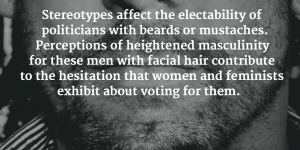Originally published May 12, 2015
In January 2015, Representative Paul Ryan of Wisconsin sported a new beard as he announced he would not seek the GOP presidential nomination for 2016. Commentators rightly connected the announcement to the new beard, because it has been more than a century since the presidency of William Howard Taft, the last White House incumbent with facial hair. In fact, ever since the mustachioed Taft completed his term in 1913, just a few years before American women won the right to vote, few U.S. politicians with facial hair have run for or served in national elected offices. Currently, fewer than five percent of the members of the U.S. Congress have beards or mustaches, according to recent estimates.
Although there has been little research about politicians’ facial hair, analysts have learned that voters make inferences about candidates based on appearance. Skin color, facial structure, and smiles all matter, because voters are ever on the lookout for short cuts, for easy clues to candidates’ issue positions and personal traits. Assessments of appearance are one way voters make guesses about candidates, so it is reasonable to assume that beards and mustaches could influence voter perceptions. Along with two colleagues, Jeanette Morehouse Mendez and Ben Pryor, I have done experiments showing that facial hair does indeed matter for politicians.
Past and Current Stereotypes of Candidates with Facial Hair
Men grow facial hair as they reach puberty and, in evolutionary terms, facial hair may well have signaled male strength and dominance. In modern democracies as well, politicians seeking election signal masculine traits when they decide to grow facial hair rather than shave it off. In the course of U.S. history, politicians with facial hair were in vogue during and after the Civil War, but became less prevalent as women gained voting rights and the double edge safety razor became available.

Today, research and theory suggest that voters may stereotype men with facial hair. Perceptions of men with facial hair as especially competent, composed, aggressive, powerful, or bold can obviously have upsides for candidates. But there are also downsides, because voters may stereotype politicians with facial hair as likely to hold issue positions inimical to feminists, such as opposition to reproductive choice for women. Voters may also see men with beards and mustaches as more supportive of gun rights, military spending, and the deployment of force.
To test these ideas, my research collaborators and I conducted an experiment using college students as subjects. Students were given photos of male members of the 110th Congress of 2007 and 2008. All members with facial hair were matched to similar looking members who did not have facial hair, with pairs defined in terms of age, race, baldness, party affiliation, and general facial structure. We also made sure that the backgrounds in the photos were similar, such as having the politicians seated near a U.S. flag. In our experiment, subjects were shown photos of the members of Congress and asked to evaluate their masculinity and issue positions and say how likely they would be to vote for the candidates in the pictures. We also asked the student subjects questions about their own political views and personal traits.
Masculinity, Perceived Issue Positions, and Electability
Experimental results confirm most theoretical expectations and the lessons of U.S. political history. Pictured members of Congress with facial hair were perceived by our student subjects as more masculine, and less supportive of feminist issue positions, although not more willing to support deployment of force. The pivotal assessment was about masculinity – in that facial hair led to presumptions about greater masculinity, which in turn influenced assumptions about issue positions. That is, male members of Congress with facial hair were seen as more masculine, and thus were presumed to be less feminist.

These stereotypes, in turn, may affect the electability of politicians with beards or mustaches. Our experimental results did not show that men with facial hair were less electable overall than men without beards or mustaches. But women and self-identified feminists among our experimental subjects said they were less likely to vote for the politicians with facial hair. Specifically, perceptions of heightened masculinity for these men with facial hair contributed to the hesitation that women and feminists exhibited about voting for them.
Perceptions versus Reality
Our research results documented likely voter perceptions about candidates with facial hair – as less open to the use of force and less feminist than otherwise similar-looking members of Congress. But did the actual voting records of members of the 110th Congress back up such perceptions? We examined roll call votes and found no evidence that legislators with facial hair voted any differently from those without facial hair. On women’s issues and legislation pertaining to the use of force, there were no significant differences between the voting records of Congressmen with and without facial hair. We do not know, however, why some Congressmen choose to sport beards and mustaches – whether they were trying to signal or hide issue positions, or were merely making choices about facial hair for esthetic or comfort reasons.

Given the dearth of presidential or other candidates with facial hair it is easy to assume that facial hair is a detriment to modern-day candidates. However, our research suggests men with facial hair can be elected, although some voters, particularly women and feminists, may be less likely to vote for candidates with facial hair. Given that possibility, however subtle, male politicians may need to think strategically before they put away their razors, especially if they are concerned about attracting women voters. Our experiments certainly suggest that such voters are likely to stereotype bearded or mustachioed candidates as more masculine and less supportive of feminist policies, but less inclined to deploy force.
Members of Congress may not, in fact, vote in-line with public stereotypes about the meaning of facial hair in today’s U.S. political arena – but it is still the case that voters can make inferences and use short-cut clues grounded in facial appearance. In short, if Representative Ryan had decided to run for the presidency in 2016, he would have been wise to shave off that beard!
—
Read more in Rebekah Herrick, Jeanette Morehouse Mendez, and Ben Pryor, “Razors Edge: The Politics of Facial Hair.” Social Science Quarterly (forthcoming).

 Research to Improve Policy: The Scholars Strategy Network seeks to improve public policy and strengthen democracy by organizing scholars working in America's colleges and universities. SSN's founding director is Theda Skocpol, Victor S. Thomas Professor of Government and Sociology at Harvard University.
Research to Improve Policy: The Scholars Strategy Network seeks to improve public policy and strengthen democracy by organizing scholars working in America's colleges and universities. SSN's founding director is Theda Skocpol, Victor S. Thomas Professor of Government and Sociology at Harvard University.
Comments 4
La Psicologia della barba — October 5, 2015
[…] invece si pensa di candidarsi in politica è meglio radersi. Infatti una ricerca di quest’anno dell’Università dell’Oklahoma ha confermato che i politici con la […]
After a Close Shave, the Beardless Status Quo Returns to Politics – Wall Street JournalAll Breaking News | All Breaking News — January 10, 2016
[…] leaders especially are held to an exacting standard, because they must win the public trust. In a study at Oklahoma State University last year, students were presented with paired photos of bearded […]
An Anti-Mustache Mandate? – A View From The Edge — July 3, 2016
[…] there is actually substantial research and anecdotal evidence to support my […]
Pourquoi les hommes politiques ne portent plus la moustache ? – Oh Judith ! — November 14, 2016
[…] Why Beards and Mustaches are Rare for Modern American Politicians […]